Blue Star Expands High-Grade Flood Zone Exposure at Surface Through Overburden Stripping and Channel Sampling Program
Highlights Include 9.82 Metres at 8.31 g/t Gold and 4.18 Metres at 14.73 g/t Gold
newsfilecorp.com
October 29, 2025 8:00 AM EDT | Source: Blue Star Gold Corp.
Vancouver, British Columbia--(Newsfile Corp. - October 29, 2025) - Blue Star Gold Corp. (TSXV: BAU) (OTCQB: BAUFF) (FSE: 5WP0) ("Blue Star" or the "Company"), a leading explorer in Canada's North is pleased to announce final results from the recently completed Exploration Program on it's Ulu Project located in the High Lake Belt, West Kitikmeot Region of Nunavut (Figure 1).
Blue Star's drilling program tested four target areas identified during the Phase I Surface Exploration Program, for a total of 1,120 metres (m). Blue Star also undertook mechanical stripping/power washing of a section of the Flood Zone deposit approximately 100 m west of the portal and 220 m east-southeast from the historically stripped section of the Flood Zone (Figures 2 and 3). Nutaaq drill results were previously reported in a News Release dated October 1st, 2025.
Flood Zone Highlights
- High-grade mineralisation exposed on the surface under less than 2 m of cover
- Strongest altered and mineralised zones returned:
- 9.82 m of 8.31 grams per tonne gold (g/t Au), 4.18 m of 14.73 g/t Au
- 6.87 m of 6.42 g/t Au, and 4.36 m of 9.03 g//t Au
- Halo alteration zones returned:
- 3.67 m of 1.18 g/t Au and 3.36 m of 1.25 g/t Au
- The main mineralisation and footwall contact of the Flood Zone is not yet exposed on the surface
"The ability to map and sample key mineralised areas of the Flood Zone deposit at surface is an important step in better understanding the mineralisation controls. This information allows us to more confidently plan for future drill testing of the deeper extensions of the deposit," said Grant Ewing, CEO of Blue Star. "Understanding the nature of this strong mineralisation at surface under negligible cover provides additional opportunities for further exploration and future development and is expected to support expansion and extension of the current mineral resource to surface."
Discussion of the Flood Zone Deposit Field Program
An area of approximately 750 m2 was mechanically stripped and power-washed exposing a 30 m strike length of Flood Zone mineralization. The newly exposed outcrop revealed the pillowed basalt host, mineralized quartz lenses and breccias, gossanous zones of strong arsenopyrite mineralization and significant biotite + pyrrhotite alteration within the basalts and haloing the mineralisation. Carbonate-altered fault zones were identified, but no mappable indications of folding at the outcrop scale were observed. The detailed mapping of the area was undertaken by a consulting geologist from Terrane Geosciences Inc.
Fifty-five (55) individual sawn channel samples were collected from eight channels crosscutting the main mineralization zones and sent to ALS Geochemistry in Yellowknife. Results for the channel samples are shown in Table 1 and Figure 3 below. The channels were cut using a rock saw and extracted using a Hilti electric chisel. Each sample was logged in detail with sulphide estimates observed from fresh cut surfaces.
In general, the mapping and channel sampling results correlate well with the established geological and resource models while showing local variability characteristic of a structurally controlled Archean gold system.
Table 1: Channel Sample Results.
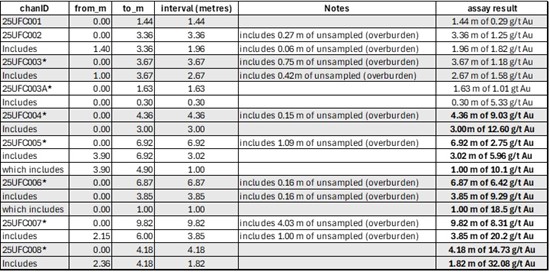
To view an enhanced version of this graphic, please visit:
images.newsfilecorp.com
*Intervals are not true widths due to oblique orientations of sampling and the variability in the exposed hanging wall and footwall contacts. Mineralisation continues under overburden; unsampled material within the channels is under overburden and accepted as internal waste at zero grade until these areas are exposed and sampled.
The historical stripped area completed in 1992 exposed ~675 m2 of the Flood Zone deposit at the northwest end of the surface trace. Figure 2 shows the location and select values of the historical sawn channel samples and Table 2 shows the results from the historical channel sampling of the mechanically stripped area. (E. Flood & P. Cowley, BHP Minerals Canada, Flood Zone Northwest Extension Gold Geochemical Trench Map 1:50, 1992).
Blue Star has not yet resampled these historical channel cuts. Historical sampling is documented within the references and related reports and appears to follow industry standards as accepted at the time of the work; no review of the historical sampling was completed by the Blue Star Qualified Person.
Discussion of the Axis-Central-Twilight Drill Program
During the 2025 drill program, five drill holes, totaling 1,120 metres were drilled into four different target areas, all located within 1000 m of the Flood Zone deposit. This release reports on the final three drill holes of 2025, each testing a unique data set. These holes include the inaugural drill hole into the Twilight prospect beneath massive arsenopyrite surface samples grading 29.2 g/t Au (News Release August 12, 2025), a test of the Axis target and the 2023 induced polarization (IP) survey data (News Release March 18, 2025), and a test of the Central target (News Release February 12, 2025) resulting in promising drill intervals of lower grade Au and significant alteration. Results for two other holes drilled into the Nutaaq area were released on October 1, 2025.
Drill hole 25UTD003 was the inaugural drill hole into the Twilight prospect. The South-Twilight zones are two contiguous areas of anomalous gold mineralization with a combined strike length of 500 m, thought to be analogous to the existing Flood Zone mineralization, located 550 m to the northwest. The South prospect has been tested by historical drilling; however, the Twilight prospect had not yet been drilled until this season. Prospecting in 2025 located massive arsenopyrite with gold mineralization at surface, returning grades up to 29.2 g/t Au (News Release August 12, 2025). The 2025 drill hole tested directly under this mineralization. Weak calc-silicate alteration hosting gold and blocky to acicular arsenopyrite mineralization was noted in several short intervals throughout the drill hole, none of which resembled the massive mineralization at the surface. The highest grade returned from the drill hole was 2.18 g/t over 0.74 m at a depth of 29.55 m (Table 3).
Drill hole 25UAD004 was designed to test an IP chargeability anomaly at a depth and orientation that had not been tested in prior drill campaigns. Prospecting during 2025 confirmed massive arsenopyrite with gold mineralization along this trend at the surface, with samples returning grades up to 10.9 g/t Au (News Release August 12, 2025). Downhole, two zones of arsenopyrite and gold mineralization were noted in altered basalt at 69.74 m and 207.3 m. A QFP dyke was intersected at 282 m, the original approximate target depth for mineralization. The upper contact of the QFP dyke was strongly silicified with calc-silicate veining and pyrite and pyrrhotite. The best interval occurred at a depth of 69.74 m, 1.12 g/t Au over 1.54 m and includes 2.59 g/t Au over 0.54 m (Table 3).
Drill hole 25UCD005 was designed to test the Central C prospect, located 300 m northeast of the Flood Zone. A 2022 hole drilled into this trend intersected a wide zone of alteration and low-grade mineralization (DD22CEN-C-022, 40.24 m @ 0.73 g/t Au, News Release October 25, 2022). The 2025 drill hole was a follow-up, testing the same horizon but at a different orientation. Three zones of weak arsenopyrite mineralization were intersected in calc-silicate altered basalt at 237.7 m, 248.7 m, and 252.38 m downhole. The strongest mineralization returned grades of 1.34 g/t over 2.16 m including 5.7 g/t over 0.3 m from a depth of 239.1 m downhole (Table 3).
Next Steps
Given the success of the mechanical stripping at the Flood Zone, planning is underway to expand this area another 15-20 m in width and 80 m in length. The current observations will be reviewed and incorporated into a revised structural model for the Flood Zone.
Each 2025 drill hole provided valuable lithological, structural and geochemical data that will enhance our knowledge of the mineralized horizons proximal to the Flood Zone. The short intervals of mineralization intersected at both the Twilight and Central targets are encouraging. The 2025 data will be integrated into Blue Star's geological and mineralization model over the winter months and utilized for drill targeting for the 2026 season.
Sampling, Assaying & QA/QC
Blue Star field programs collect a variety of samples; prospecting rock samples are selective by nature, channel samples are saw-cut samples from outcrop intended to be representative of the exposed mineralisation and are approximately 5 cm in width and 8 cm in depth; drill core samples are sawn in half with one half retained as core record and the other half submitted for analysis.
Blue Star samples are delivered under chain of custody to ALS Geochemistry in Yellowknife, NT for sample preparation which are then forwarded to ALS Canada Inc. in North Vancouver, BC for final analysis. Samples are prepared using code PREP-31 (crushing and pulverising) and analysed using codes Au-AA26 (50-gram fire assay with atomic absorption finish) and ME-MS61 (48 element four acid digestion with ICP-MS finish). Samples returning >10 g/t Au are reanalysed under code Au-GRA22 (50-gram fire assay with gravimetric finish). Over limits for non-gold elements are ore grade four acid digestion with ICP-AES finish. The work is being conducted using industry standard procedures, including a quality assurance and quality control ("QA/QC") program consisting of the insertion of certified standards, blanks and duplicates into the sample stream.
Qualified Person
Darren Lindsay, P. Geo. and Vice President Exploration for Blue Star, is a Qualified Person under National Instrument 43-101 ("NI 43-101") and has reviewed and approved the technical information contained in this news release.
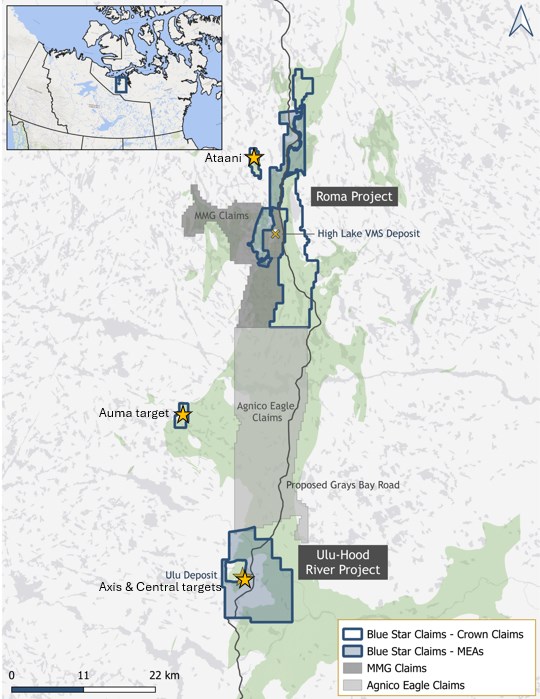
Figure 1: Location Map of Blue Star Projects and Landholdings.
To view an enhanced version of this graphic, please visit:
images.newsfilecorp.com
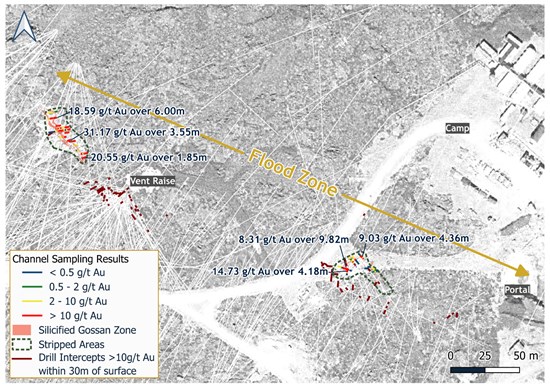
Figure 2: Flood Zone Deposit, Historic and Current Mechanically Stripped Locations.
To view an enhanced version of this graphic, please visit:
images.newsfilecorp.com
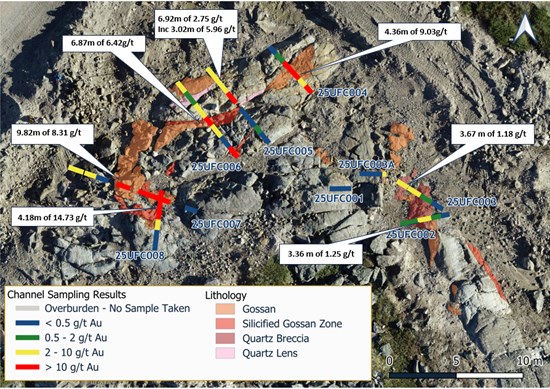
Figure 3: Flood Zone Deposit, 2025 Channel Sample Locations & Results.
To view an enhanced version of this graphic, please visit:
images.newsfilecorp.com
Table 2: Channel Results from the Original Stripped Area of the Flood Zone Deposit.
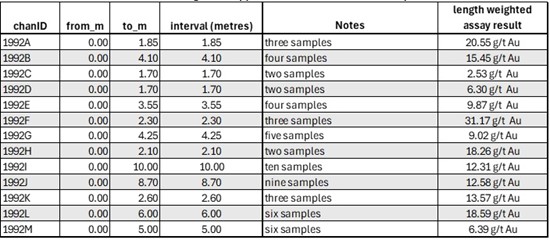
To view an enhanced version of this graphic, please visit:
images.newsfilecorp.com
*Intervals are not true widths due to oblique orientations of sampling and the variability in the exposed hanging wall and footwall contacts.
Table 3: 2025 Drill Hole Locations and Results.

To view an enhanced version of this graphic, please visit:
images.newsfilecorp.com
* Insufficient drilling has been completed to determine true widths; downhole intervals are reported.
About Blue Star Gold Corp.
Blue Star is a mineral exploration and development company focused in Nunavut, Canada. Blue Star's landholdings total 300 square kilometres of highly prospective and underexplored mineral properties in the High Lake Greenstone Belt. The Company owns the Ulu Gold Project, comprised of the Ulu Mining Lease and Hood River Property, and the Roma Project. A significant high-grade gold resource exists at the Flood Zone deposit (Ulu Mining Lease), and numerous high-potential exploration targets (gold and critical minerals) occur throughout the Company's extensive landholdings, providing Blue Star with excellent resource growth potential. The site of the future deep-water port at Grays Bay is 40 - 100 km to the north of the properties, and the proposed route corridor for the all-weather Grays Bay Road passes close by the Roma and Ulu Gold Projects.
Blue Star is listed on the TSX Venture Exchange under the symbol: BAU, the U.S. OTCQB Venture Market under the symbol: BAUFF, and on the Frankfurt Exchange under the symbol: 5WP0. For information on the Company and its projects, please visit our website: www.bluestargold.ca.
For further information, please contact:
Grant Ewing, P. Geo., CEO
Telephone: +1 778-379-1433
Email: info@bluestargold.ca
Neither the TSX Venture Exchange nor its Regulation Services Provider (as that term is defined in the Policies of the TSX-Venture Exchange) accepts responsibility for the adequacy or accuracy of this Release.
CAUTIONARY NOTE REGARDING FORWARD-LOOKING STATEMENTS AND INFORMATION
This press release contains "forward-looking statements" within the meaning of applicable securities laws. Forward-looking statements can be identified by words such as: "anticipate," "intend," "plan," "goal," "seek," "believe," "project," "estimate," "expect," "strategy," "future," "likely," "may," "should," "will" and similar references to future periods. Examples of forward-looking statements include, among others, statements we make regarding prospective income and revenues, anticipated levels of capital expenditures for the fiscal year, expectations of the effect on our financial condition of claims, litigation, environmental costs, contingent liabilities, and governmental and regulatory investigations and proceedings, and estimates of mineral resources and reserves on our properties.
Forward-looking statements are neither historical facts nor assurances of future performance. Instead, they are based only on our current beliefs, expectations, and assumptions regarding the future of our business, plans and strategies, projections, anticipated events and trends, the economy, and other future conditions. Because forward-looking statements relate to the future, they are subject to inherent uncertainties, risks, and changes in circumstances that are difficult to predict and many of which are outside of our control. Our actual results and financial condition may differ materially from those indicated in the forward-looking statements. Therefore, you should not rely on any of these forward-looking statements. Important factors that could cause our actual results and financial condition to differ materially from those indicated in the forward-looking statements include, among others, the following: economic and financial conditions, including volatility in interest and exchange rates, commodity and equity prices and the value of financial assets, strategic actions, including acquisitions and dispositions and our success in integrating acquired businesses into our operations, developments and changes in laws and regulations, including increased regulation of the mining industry through legislative action and revised rules and standards applied by the regulatory bodies in Nunavut, changes in the price of fuel and other key materials and disruptions in supply chains for these materials, closures or slowdowns and changes in labour costs and labour difficulties, including stoppages affecting either our operations or our suppliers' abilities to deliver goods and services to us, as well as natural events such as severe weather, fires, floods and earthquakes or man-made or other disruptions of our equipment, and inaccuracies in estimates of mineral resources and/or reserves on our mineral properties.
 SOURCE: Blue Star Gold Corp. SOURCE: Blue Star Gold Corp. |










